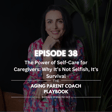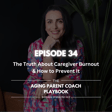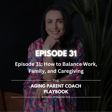Become a Creator today!Start creating today - Share your story with the world!
Start for free
00:00:00
00:00:01

Episode 22: Navigating Family Dynamics in Caregiving
Welcome to The Aging Parent Playbook! In this episode, Dr. Barbara Sparacino dives into one of the biggest challenges caregivers face—managing family dynamics. Caregiving isn’t just about supporting an aging loved one; it’s also about navigating sibling disagreements, financial stress, and unbalanced caregiving roles.
We’ll break it down into five key areas:
✅ Understanding common family challenges
✅ Improving communication to reduce conflict
✅ Defining caregiving roles and responsibilities
✅ Managing disagreements constructively
✅ Prioritizing self-care to prevent burnout
Family stress shouldn’t be the reason you feel overwhelmed. Let’s explore practical strategies to create a more balanced caregiving experience. Tune in now!
Transcript
Introduction and Episode Focus
00:00:00
Speaker
Hello and welcome to episode 22 of the Aging Parent Playbook, where we provide strategy, support and insights for caregivers managing the complexities of elder care. I'm your host, Dr. Barbara Sparacino, and today we're tackling a topic that can be just as emotionally draining as caregiving itself, family dynamics.
Managing Family Dynamics in Caregiving
00:00:19
Speaker
Caregiving isn't just about supporting your aging loved one. It's about managing relationships with siblings, spouses and extended family members who all have their own opinions, emotions, and expectations. You might be navigating conflicting opinions on care decisions, financial stress, or imbalanced caregiving roles, all while trying to do your best.
Challenges in Family Caregiving
00:00:39
Speaker
And what's best for your aging parent? If this sounds familiar, you're not alone. Today, we're breaking it down into five key areas. Understanding family challenges, improving communication, defining roles, managing conflict, and prioritizing self-care.
00:00:54
Speaker
Because let's be honest, family stress shouldn't be the reason you burn out. So let's dive in. So let's first talk about why understanding the challenges, why family caregiving is so complex.
00:01:05
Speaker
Caregiving can bring families closer, but it also introduces stressors that weren't there before. what used to be simple family interaction, now involve medical decisions, financial concerns, and questions about fairness.
00:01:17
Speaker
Who's doing the most? Who's making the final call? Who's contributing financially? These issues don't always bring out the best in people. So what are some common family challenges
Effective Communication Strategies
00:01:27
Speaker
in caregiving? Well, there's unequal burden when one person,
00:01:30
Speaker
often the adult daughter, becomes the primary caregiver while others take a back seat. There's differing opinions. Siblings or other relatives may disagree on care decisions from in-home support to long-term care.
00:01:41
Speaker
Financial tensions. Who's paying for that? Disagreements over medical costs, home care, or power of attorney can create resentment. And you know role reversals. When adult children step into a parental role, emotions can run high, triggering guilt, frustration, or denial. Recognizing these patterns is the first step towards addressing them because you can't fix what you don't
Role Assignment and Conflict Resolution
00:02:03
Speaker
see and acknowledge. Now let's talk about communication. It's key.
00:02:06
Speaker
But how do you have better family conversation? If you're feeling overwhelmed by family dynamics, start here. better communication. Many conflicts arise not because people don't care, but because they don't feel heard, valued, or included. Let me give you some tips for effective communication and family caregiving. First, schedule regular family meetings.
00:02:25
Speaker
Set a consistent time, weekly, monthly, to update everyone on care decisions. Use video calls if family members live in different locations. Be transparent about needs and responsibilities. Look, use I statements. I feel overwhelmed managing everything alone.
00:02:39
Speaker
Avoid blame, instead of saying you never helped, say I could use more support. Use caregiving group chat or shared document. Keep everyone updated on doctor's appointments, medications and needs.
00:02:50
Speaker
This minimizes miscommunications and feelings of exclusion. Also set boundaries with difficult family members. Some people will never be as involved as you'd like. Focus on what they can do, even if it's small.
00:03:01
Speaker
A family meeting can be the difference between burnout and balance. Look, even if everyone isn't on board, Having a clear communication plan puts you in a position of strength. So let's talk about defining roles and responsibilities. Let's avoid it being the one person show.
00:03:17
Speaker
One of the biggest sources of resentment in caregiving is an unequal division of labor. where one person does everything while others watch from the sidelines. If you're the primary caregiver, this might sound familiar, but you don't have to do it alone.
00:03:30
Speaker
Now, how do you assign roles in caregiving? First, let's talk about assessing strengths and availability. Who is good at what? Look, some people are better at finances while others can provide emotional support or hands-on care.
00:03:42
Speaker
I suggest you be clear and document responsibility instead of vague statements like, help out more, say, Can you handle scheduled in doctor's appointments? Can you contribute $100 a month towards home care?
00:03:53
Speaker
Can you take over grocery shopping for mom? And more challenging part, accept that some won't step up and don't let it derail you. Focus on solutions, not resentment. Look, caregiving isn't a solo act.
00:04:06
Speaker
Even if you feel like the default caregiver, delegating tasks, big or small, can really relieve your
Self-Care and Support for Caregivers
00:04:13
Speaker
burden. Now, managing conflicts. When family disagreements become tense, you know,
00:04:18
Speaker
Let's be real, some caregiving conflicts get ugly. Whether it's about money, medical decisions, or fairness, these disagreements can escalate quickly. The key is to stay solution focused.
00:04:29
Speaker
You know, how to handle these conflicts? Take a step back before reacting and ask, what's really the issue here? Try to find common ground. Even when people disagree, they usually share a common goal, wanting what's best for their loved one.
00:04:43
Speaker
And maybe use a neutral mediator, a social worker, a therapist, an elder care attorney, their physician, can help resolve disputes. And also, this is might be the most important, know when to let go.
00:04:55
Speaker
Some battles aren't worth fighting. Prioritize your emotional energy. Not every family disagreement can be fixed. The goal is not perfection, it's peace. And you know, self care. How do you stay sane while managing all this?
00:05:08
Speaker
And here's the hard truth. If you don't take care of yourself, no one else will. And the more burdened you become, the harder caregiving and dealing with family gets. So here are some self care tips for the caregivers.
00:05:21
Speaker
Set boundaries. Stay no to toxic dynamics or over committing. Take breaks. Even a 15 minute walk, especially outside, can clear your head. Find support.
00:05:31
Speaker
Caregiver support groups can help you feel less alone. Prioritize your health. Don't neglect your own doctor's appointments. Remember, self-care isn't selfish. It's necessary. You can't pour from an empty cup.
Conclusion and Resources
00:05:43
Speaker
So look, family caregiving is not is a marathon. It's not a sprint. The more you set boundaries, improve communication, and delegate roles, the smoother the journey will be. It won't always be perfect.
00:05:56
Speaker
but it can be manageable. If this episode resonated with you, share it with someone who might need it. And if you're looking for more caregiving resources, visit my website, theagingparentcoach.com.
00:06:06
Speaker
And until next time, take care of yourself too.



















